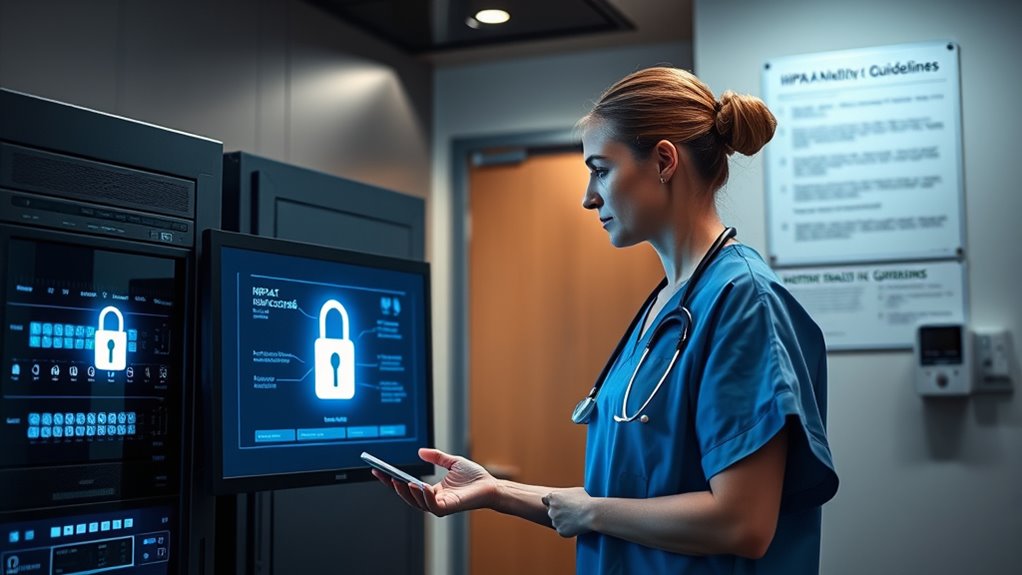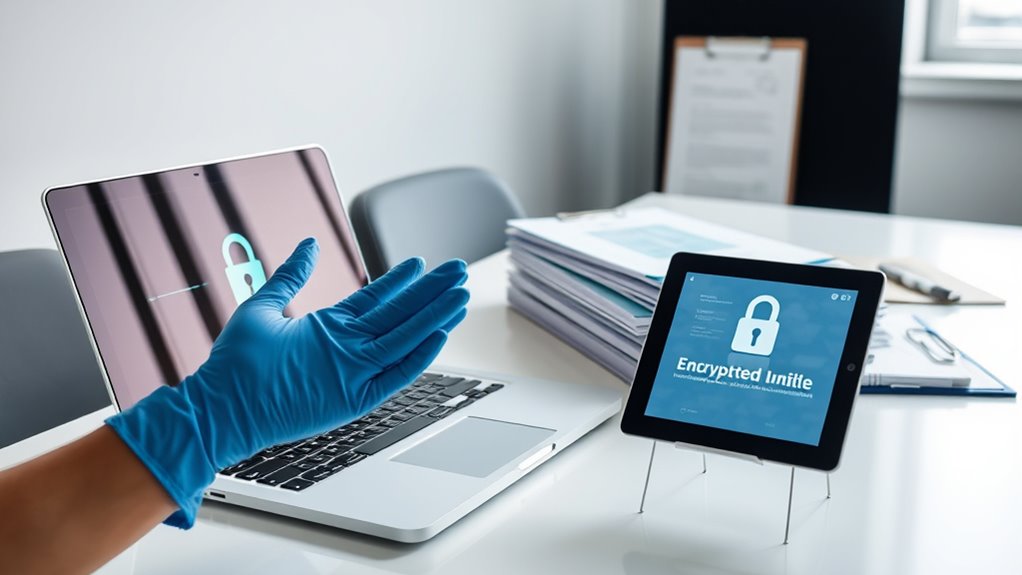Under HIPAA, you must securely store and share medical files by using encryption and access controls to protect patient privacy. Only authorized personnel should access sensitive information, and all transmissions should use secure channels like encrypted emails or protocols. Regular staff training and audits help maintain compliance and prevent breaches. If you want to understand how to implement these measures effectively, there’s more to examine that can help you stay compliant and safeguard data.
Key Takeaways
- Use encryption to protect PHI during storage and transmission, ensuring data remains unreadable without proper keys.
- Implement strict access controls, limiting file access to authorized personnel based on the minimum necessary standard.
- Ensure secure sharing through encrypted emails, secure portals, or compliant file transfer protocols.
- Regularly train staff on HIPAA compliance, privacy policies, and secure handling of medical files.
- Maintain audit logs and disclosures to ensure transparency and facilitate monitoring of data access and sharing activities.

Understanding HIPAA rules is essential when storing and sharing medical files, as they safeguard patient privacy and guarantee data security. When you handle sensitive health information, you must make certain that patient privacy remains protected at all times. One of the core strategies for achieving this is through the use of data encryption. Encrypting data transforms it into an unreadable format unless someone has the proper decryption key. This means that even if unauthorized individuals access the files, they won’t be able to interpret or misuse the information. Data encryption is a fundamental safeguard, especially when transmitting files electronically or storing them on servers that might be vulnerable to cyber threats.
Encrypting data is vital for protecting patient privacy and securing medical files against unauthorized access.
HIPAA mandates that all protected health information (PHI) be secured against unauthorized access. This applies whether you’re sharing files with other healthcare providers, insurance companies, or patients themselves. To comply, you should implement encryption protocols for data at rest—such as stored files—and data in transit, like emails or online portals. Encryption acts as a barrier, ensuring that any intercepted information remains unintelligible to attackers. Along with encryption, you need to establish strict access controls, so only authorized personnel can view or modify sensitive data. This minimizes the risk of accidental disclosures or malicious breaches.
Patient privacy isn’t just about encryption; it also involves managing who has access to medical files and under what circumstances. You should have policies in place that specify how and when information can be shared, always aligning with HIPAA’s minimum necessary standard. This standard requires you to share only the information needed for a specific purpose, reducing unnecessary exposure. When sharing files electronically, secure communication channels like encrypted emails or secure file transfer protocols are essential. Never send PHI through unsecured channels, as this puts patient privacy at risk and violates HIPAA regulations.
Training your staff on HIPAA compliance is equally important. Make sure they understand the importance of maintaining patient privacy and the role encryption plays in protecting data. Regular audits and monitoring of access logs help detect any unauthorized activity early. Remember, safeguarding patient information isn’t just about following rules; it’s about respecting their trust and ensuring their sensitive data remains confidential. By prioritizing data encryption and strict access controls, you create a secure environment where patient privacy is protected, and HIPAA compliance is maintained at all times. Additionally, maintaining affiliate disclosures ensures transparency and compliance with regulations when sharing or storing medical files.
Frequently Asked Questions
How Are Electronic Medical Records Protected Under HIPAA?
You protect electronic medical records by using strong encryption to keep data secure and prevent unauthorized access. Access controls are essential, so you limit who can view or modify the records based on their roles. Regularly updating security protocols and monitoring access helps guarantee compliance with HIPAA, safeguarding patient information. By implementing these measures, you maintain confidentiality and ensure that sensitive medical data stays protected from breaches.
What Are the Penalties for Non-Compliance With HIPAA?
Imagine walking a tightrope—one misstep leads to serious consequences. If you commit HIPAA violations, you face hefty financial penalties, which serve as a stark warning. The government enforces strict penalties for non-compliance, ranging from fines to criminal charges. Your organization must stay vigilant to avoid these risks. Non-compliance isn’t just a minor slip; it can cost you financially and damage your reputation, so prioritize HIPAA adherence.
Can Patients Access Their Stored Medical Files Easily?
You have the right to access your medical files easily. Under patient rights, healthcare providers must give you access within a reasonable time frame, usually 30 days. They may charge a small fee for copying or mailing your records. If you experience delays or obstacles, you can request assistance or file a complaint. Ensuring your medical file access is straightforward is a key part of respecting your rights.
What Should Be Done if There’s a Data Breach?
When facing a data breach, remember that swift action matters. You should follow established data breach protocols and activate your incident response plans promptly. This involves notifying affected individuals, securing systems to prevent further exposure, and working with authorities if needed. By acting quickly and systematically, you protect trust and minimize harm. Fundamentally, your response reflects your commitment to safeguarding sensitive information and maintaining integrity amid challenges.
Are There Specific HIPAA Rules for International Data Sharing?
You should know that HIPAA doesn’t have specific rules for international data sharing. When engaging in international data transfer, you need to ensure cross border compliance by safeguarding protected health information (PHI) according to HIPAA standards. It’s your responsibility to implement safeguards like encryption and secure transfer methods, and verify the recipient’s compliance. Always stay updated on international laws to prevent violations and protect patient privacy effectively.
Conclusion
By following HIPAA rules, you’re not just protecting medical files—you’re safeguarding the very future of healthcare itself! Ignoring these regulations could release chaos, risking identity theft, massive fines, and losing trust faster than you can say “privacy breach.” So, stay vigilant, stay compliant, and treat every medical file like a treasure chest. Because in the world of health data, following HIPAA isn’t just important—it’s the ultimate shield against disaster!








